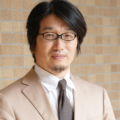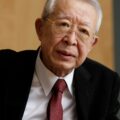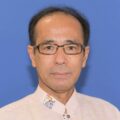Former Self-Defense Forces Members Volunteering in Mine Clearance Overseas: They see it as, “Work only we can do.” — An international contribution using a developed skill
In May 2002, retired UXO (Unexploded Ordnance) disposal experts from the Ground Self-Defense Force, established a new organization, the Japan Mine Action Service (JMAS). An estimated 100 million mines and UXO are left untreated around the world. JMAS is an NPO formed to dispose of these by giving local specialists skills and information, working alongside them. Why would people who might have been leading a comfortable retirement life with their grandchildren set out for mine areas? What are their real activities? What are they thinking of? Natsume Yukiaki listened to their frank words.
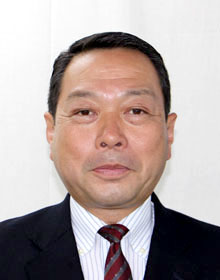 |
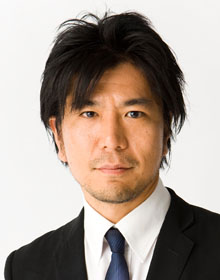 |
|
Arakawa Ryuichiro |
Natsume Yukiaki |
Not About Risking Your Life
Natsume Yukiaki: Specifically, how do you go about removing mines and unexploded bombs?
Arakawa Ryuichiro: In Cambodia, we meet up with former soldiers from the time of the old Pol Pot group, or the Samrin regime. We start off by asking if there are any buried mines in a particular place. According to international law, for anti-personnel and anti-tank mines, records should be kept of the type of mines used and where they are buried. In fact, there are virtually no records remaining.
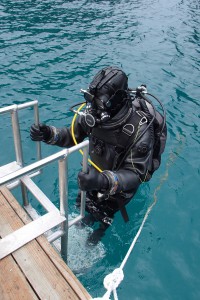
Underwater disposal activities in Palau.
Photo: Courtesy of Japan Mine Action Service (JMAS)
Then when we hear of a place where they may be buried, we duly go forward searching with mine detectors meter by meter, and sure enough there are mines there. Incidentally, the feeling you experience according to experts is a sense of aversion. There is anxiety and fear, but it is also mixed with a sense of duty, of having to go through with it. No matter how much one grows accustomed to it, the same feeling remains.
The next step is the same also for UXO (Unexploded Ordnance). You have to avoid giving a shock, the type of device has to be classified, and you have to find out the method of removing the fuse. You then follow the procedure to remove the fuse and carry out the exploding disposal process.
Natsume: You don’t seem to use mechanical devices for anti-personnel mines and dispose of them mechanically.
Arakawa: You decide on the disposal method, mechanically or manually, thinking of the most effective way having regard to plants and land configuration of the mine field, and the possibility that anti-tank mines may be present. Actually a lot of them are removed by hand. As many mine fields are now covered with bamboo groves and trees, clearing requires a big effort. In addition, in the dry season the ground dries out and cracks open up, and then in the rainy season the roads that have just been leveled turn to mud and get cut off, so the work takes a lot of effort and a long time.
Natsume: But risking life …
Arakawa: No it’s not like that. To be honest there is no place for risking life.
Natsume: How is that?
Arakawa: The former Self-Defense Forces personnel on the site are experts. They develop an appropriate plan, stay with the process, and carry out the disposal so that there shall be no chance of an accident. If something is unclear in the disposal process they do not operate unless they are certain about handling. In such a case, they exchange information with organizations involved in demining throughout the world, and until they find a 100% safe method, no one enters the site and they quietly wait it out.
Imai Yohei is a JMAS expert in Cambodia. He says that the most important thing of all required for demining is 100% safety. The demining staff appointed to the disposal, who carry out the operation, must also have full safety. The area cleared and released back to local people for farming must have full safety. Therefore the skill in demining is to make sure that all mines are cleared perfectly. It is the deminer who can create 100% safety and provide assurance by sticking to basic procedures repeatedly to the point of simplicity. This is the way that leaves no possibility of error.
Natsume: That makes sense. Traffic accidents are like that too. Even though you can ignore a traffic light and go through harmlessly once, if you repeat that action 100 times or 1,000 times an accident will occur. So that means that even though no vehicle is coming the simple attitude of not crossing against a red light is important.
Arakawa: That’s right. It is not about risking your life. Basically it’s about taking reliable action to fulfill the given task safely. It might have to do with the Self-Defense Forces tradition. For example it was like that with the peacekeeping operations [PKO] overseas. The Ground Self-Defense units kept the tents and vehicle rows exactly along horizontal lines, squared and parallel. Opposing forces would note that military discipline was strict and decide to stay away.
Natsume: I have a friend in the Self-Defense Forces and I remember that when he put his shoes in a shoes box he lined the heels right up against the edge of the shelf and he put the shoes in parallel.
Arakawa: You might think that shoes or tents are not so important but when you do not pay attention to the basics, mental attitudes may slacken and omissions start to be made. It is like that on site where we do mine clearance. For example in Africa, in the People’s Republic of Angola, local people are working with JMAS using demining machines and construction machines. The former Self-Defense Forces staff on the site go through the basic drill to enhance discipline every morning and then raise the Angolan national flag. Then they call out as they run, and work starts. So this is not risking their lives. Well, perhaps doing the exercises is a kind of obsessive habit [laughs].
The efforts of former Self-Defense personnel moved a country
Natsume: Please explain how JMAS came to be established.
Arakawa: There are five Ground Self-Defense Forces corps in mainland Japan and they have special EOD (Explosive Ordnance Disposal) units. In addition, in Okinawa there is a highly trained and equipped EOD unit, and these four organizations take full responsibility for disposal in Japan of UXO (Unexploded Ordnance) remaining from WWII. The specialists involved in this work asked themselves how they could contribute to the people who suffered from UXOs after retiring from service.
However, they did not know how. They wanted someone to set up an organization and made a request to the former senior leadership of the Ground Self-Defense Force. The founding president was Doi Yoshinao, who was a defense attaché in Sweden and had also been chief of Ground Material Control Command, which is in charge of supply and maintenance for the GSDF. He played a core role in setting up JMAS in 2002.
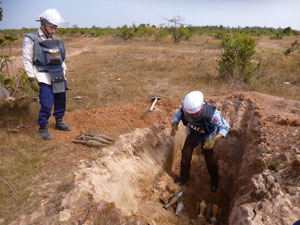 |
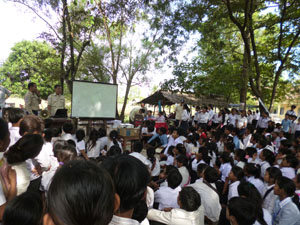 |
|
On the job training in UXO disposal skills in Cambodia. |
JMAS experts conduct mine-risk education. |
Natsume: I see. So then there was a feeling in their former workplace that they should make an international contribution and a contribution to peace.
Arakawa: That’s right. JMAS is an organization formed by former members of the Self-Defense Forces, on their own initiative. There is no political color to it. In fact when it was first set up there were no funds and they got together to raise their own money, carried out various activities, and then traveled out to the place where they would be in action.
As the organization was formed like that, there was a special flavor to its activities. We ourselves act as instructors and explain the methods for demining. As all of the JMAS staff on site joined JMAS after retirement, what they are doing is quite an effort physically [smiles]. But putting that aside, the speed of disposal could be accelerated if the local people learn the method and do it by themselves rather than having foreign organizations come and clear the mines. We are carrying out demining, but also train local people and assist their own demining. A prominent feature of our group is staying with the local people.
Natsume: Do you listen to the needs of people in the localities?
Arakawa: Yes. If we simply dispose of mines and just leave a wilderness behind there would be little benefit for local people. So we talk with the local village leaders about their wishes and what facilities they need after clearance. For example, constructing roads and creating crop land, building schools or irrigation ponds, we decide aiming at the development of the local communities. For this development, Komatsu, Ltd. has been providing funds and demining machines, so we are able to continue our “demining to farming” activities.
Natsume: Wasn’t there a lot of work in gathering the funds?
Arakawa: At the beginning we were unable to gain the ear of government. One year on, our funds ran out and we had to raise money from all involved once again, so it was a rather difficult start. But the first chairman, Nishimoto (Nishimoto Tetsuya, former chairman of the Joint Staff Council of the Self-Defense Forces), made a considerable effort and JMAS was awarded the Yomiuri International Cooperation Prize. That attracted the attention of the Foreign Ministry and grant aid from the government started coming to JMAS.
In addition, the Self-Defense Old Boy [OB] network got active and approached various corporations and gradually the circle of donors got wider.
Natsume: You mean at first everyone worked as volunteers with the sweat of their brow, and that called up support.
Arakawa: You could say that. First, we set up facilities like containers as an operation base bearing the Japanese flag. Eventually, people of Japanese companies in the area start visiting the base and a relationship starts. I think the existence of former Self-Defense Forces personnel encourages them. Thanks to such a relationship, we started to receive funds from Japanese companies. Of course, even if funds are not provided we won’t come back [laughs].
Natsume: As a result, the activities expanded, didn’t they?
Arakawa: Yes. When we set up our operation overseas there were a few dozen people, but now it has grown to 400 members including staff from local demining organizations. Then by 2013, 377,234 UXOs and mines had been cleared in the four countries of Cambodia, Laos, Afghanistan and Angola.
Focusing on Training
Natsume: What are problem areas for the experts in the field?
Arakawa: The difference in climate such as the oppressive heat is very trying. At the same time there is no safe water in Angola for example, and you cannot eat raw food. In our Mabubas base we have a kitchen and we take it in turns to cook. But the hygiene is not good so that we need to take care of sterilization so as not to get sick. Cambodia and Laos seem to be the same. There is malaria and dengue fever… . Also, traffic conditions are bad and there is risk of a traffic accident. Moreover, medical standards are far from sufficient.
Natsume: And this is a time when you should really be enjoying playing with your grandchildren. At what point can you return to Japan?
Arakawa: We are depending on Japan’s overseas development assistance [ODA] so we work on a yearly basis. Some return after one year, others go for several years. Sometimes we ask to go again after a short rest, and they may say OK. To be frank, if no replacement is found, we ask our staff to stay longer.
Natsume: Do you have difficulty with the local customs?
Arakawa: Teaching the local people basic skills takes time. For example, in order to survey a minefield, basic mathematical knowledge is needed, like working out the area of a rectangle, and in some cases the local people do not have this school education. For example, in Cambodia, due to the holocaust by the Pol Pot regime there are very few alive over fifty and education was non-existent at that time. Now we are training the right way to search and detect land mines to women graduated from high school, and they are forming our main strength, but in the early stage, we started by teaching the alphabet and mathematics.
Natsume: Do language difficulties pose a communication problem?
Arakawa: Yes. And because of that foreign NGOs sometimes conduct demining activities on their own and then go home. But in that case, only a part of the national highways, for example, may be cleared and the benefit to the people is limited. So we are focusing on training local people.
For example in Laos, we have received a request from the people in the local UXO handling organization to build a training center. From next year JMAS will be teaching there. During the training, advanced skills will be taught. Afterwards, it is expected that the Laos nationals who took part in the course will operate as instructors locally and pass on disposal skills. This is the system we have in mind.
Natsume: It will take time to attain a peaceful situation without mines and UXOs.
Arakawa: Yes, that’s right. And also I think that is the right way. For example, recently in Angola oil has been exploited, and to tell the truth they have money. There is a local demining organization, and anti-personnel demining machines are being purchased. But they were just being left in the field. They did not know how to operate machines and cope with parts that are made with a special alloy and require special welding skills to repair.
In Cambodia, there are various types of explosive devices. Amongst UXO, different types of bombs were dropped by the US Air Force during the Vietnam War to cut the Ho Chi Minh route. In Laos as well. The most troublesome bomb is that with a long delayed fuse, which was set to explode say one month after dropping. It is quite difficult to deal with. As you might expect, special knowledge is needed.
In addition, education for local people is needed to ensure that if an UXO is found it is not touched. In some places small bombs called submunitions from cluster bombs lie scattered. [A cluster bomb is a device with a number of small bombs contained within a larger body. Many small bombs that failed to explode are still randomly scattered about. There is an international treaty, the Convention on Cluster Munition (DDM), to eradicate this weapon.] Children turn these into playthings like a ball and when it strikes against a very hard object may explode. So we need to continue the risk awareness education of UXO to the local people.
A Matter-of-Fact Strength
Natsume: On the subject of the many types of explosive devices, recently, in the Republic of Palau, JMAS disposed depth charges in the sea.
Arakawa: These are depth charges that Japan brought to Palau during WWII. If you have read Shiba Ryotaro’s book Saka no ue no kumo (Clouds Above the Hill) you may know that the Japanese military used Shimose explosive powder during the Japan-Russia War. This explosive powder contains a substance called picric acid. This picric acid leaks out into the sea and when divers come in contact with it they can suffer skin burn and headaches.
That happens near Palau harbor in a place called “Helmet Wreck” where lots of steel helmets are piled up on a Japanese transport ship sunk by a U.S. air attack. A heap of 165 depth charges are left in it. Seventy years have passed since the war, and the depth charges are rusting and leaking the picric acid inside. JMAS experts, retired from the EOD (Explosive Ordnance Disposal) unit of the Maritime Self-Defense Force, are conducting disposal activity with special underwater gear that allows them to pass through this polluted area. They are using a special coating agent to seal cracks from which the picric acid is leaking. As of the end of April, of about 165 items, repair work for 14 items has been completed.
Natsume: Judging from the difficult underwater conditions, this operation seems to have a long way to go. It’s enough to make one feel dizzy. Well, finally, let me ask a slightly difficult question. I want to know about the motivation of JMAS staff overseas. Why do JMAS staff put themselves in severe climates and environments and carry out these activities? Tell us about the source of that resolution.
Arakawa: Some people say that at the end of their lives they want to have no regrets. Takayama Ryoji, who was once active as a JMAS staff member, is still working in Cambodia. He said to his wife that he had a severe “Cambodia sickness” that could not be cured unless he went to Cambodia, and he persuaded her to let him go. Three days after retirement day, he got on a plane. The reason was the experience he had of being sent to Cambodia on the PKO mission. It is a country where millions of land mines remained. But because of Japanese government policy, the activity of our PKO units was limited only to restoration work on bridges and roads. They were just looking at the local people victimized by UXO and mines. He also said the best way of cleaning up after war is by engaging people with knowledge of war.
Mr. Doi, who founded the group, works on the belief that one Japanese expert, one pick-up truck, and three Cambodian people could form one EOD team with an annual expense of around 5 million yen. At this level of operation JMAS could manage to continue activities for two to three years without outside support. He also said, “It is our responsibility to do work that only we can do.”
At the same time I wonder if the motivation is so difficult to understand. Actually, I think that being able to use one’s special skills irrespective of age is very fortunate. Of course all the specialists and directors have a sense of mission: the feeling they want to make a contribution to world peace comes from the bottom of their hearts. But all are already getting on in years, and the title of the booklet we are publishing is Oyaji no kokusai kouken (Old men’s international contribution) [laughs]. So I think you could say they are relaxed. Lots of people are going on with their work calmly in that state of mind.
Translated from “Sosetsu 60 shunen. Nicchu reisen, kawaru jieitai/Kaigaide jiraijokyo ni hagemu moto jiei-kanryo tachi: “Warewarenishika dekinai shigoto” tono omoi ― tsuchikatta gijutude kokusaikoken (the 60th anniversary of founding. The Changing Self-Defense Forces During the Sino-Japan Cold War/Former Self-Defense Forces Members Volunteering in Mine Clearance Overseas: They see it as, “Work only we can do.” — An international contribution using a developed skill),” Voice, August 2014, pp. 92-99. (Courtesy of PHP Kenkyusho) [August 2014]
